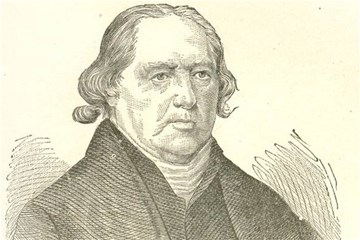We’ve all heard the names John and Charles Wesley, but there are a lot of other important names in the history of Methodism you may not know. The Unsung Heroes of Methodism series tells the stories of lesser-known figures whose lives and witness still impact The United Methodist Church today, even if their names aren’t familiar to us.
He was a Methodist pastor, an American patriot, a strict pacifist, a committed abolitionist and one of the most passionate preachers of his generation. Freeborn Garrettson has been called “Methodism’s Paul Revere” because of the amount of time he spent traveling on horseback to preach the Gospel.[1]
Meet more heroes
Garrettson was born into a wealthy family in Colonial Maryland in 1752. His family owned a number of slaves. Garrettson claimed to have had spiritual visions at the age of the 10, but his spiritual journey was put on hold by personal tragedy. He lost his mother and a sister as a young child that left him depressed and isolated for many years.[2]
In the 1770s, Garrettson heard the preachings of Methodists Robert Strawbridge and Joseph Pilmore. Their sermons awakened something in Garrettson who became a pupil to Methodist superintendent Francis Asbury. The two became lifelong friends and Asbury approved him becoming an itinerant preacher in 1776. Around the same time, he inherited his father’s estate and immediately set about freeing his family’s slaves.[3]
Garrettson was beginning his ministry at the start of the American Revolution. Most Methodist leaders tried to stay neutral in the conflict between the Colonies and Britain, but Garrettson was unique in supporting the principles of the American Revolution, though he was also a pacifist who opposed the war itself. He continued to preach openly at a time when many Methodists, including Asbury, had gone into hiding. Garrettson was persecuted and even beaten for refusing to support the war.[4]
Garrettson’s experiences during the Revolution showed he would not be intimidated into compromising his beliefs even if they proved unpopular at the time. Garrettson’s fearlessness was most apparent in his witness against the evils of slavery. His anti-slavery sermons in Maryland would result in him being imprisoned at least once, but they had an incredible effect on those who heard them. Among those moved by Garrettson’s preaching was a Delaware planter named Stokeley Sturgis who decided afterward to free his slaves. Among those emancipated was a self-educated young man named Richard Allen, future founder of the African Methodist Episcopal Church.[5]
In 1784, Garrettson was sent to Nova Scotia, Canada, as a missionary. Three years later, he returned to the United States to attend the General Conference held in Baltimore. There he was nominated to serve as bishop over Methodist missions in the Caribbean, but he turned down the honor. Instead, he settled in the town of Rhinebeck, New York, dividing his time between preaching locally and circuit riding across the state. In 1793, he married a woman named Catherine Livingstone, whose family was one of the richest in New York. They had at least one daughter named Mary.[6] By the time of his death Garrettson had preached all along the east coast between North Carolina and Nova Scotia.
Garrettson continued to attend general conferences until the very end of his life. He often lent his support to petitions and efforts to make The Methodist Episcopal Church (MEC) more democratic and give greater power to the laity. Though his petitions often were voted down and he watched in horror as the church’s teachings against slavery were relaxed, Garrettson remained faithful to The MEC throughout his life, continuing to advocate for reform from within the denomination. Garrettson died in his home on September 26, 1827, at the age of 73. Years earlier, he published a detailed journal of his early life, providing us with a detailed account of life and thoughts.[7]
This content was produced by UMC.org on March 6, 2024. Philip J. Brooks is a writer and content developer at United Methodist Communications. Contact him by email.
[1] “Freeborn Garrettson: Methodism's Paul Revere.” United Methodist Communications
[2] Simpson, Robert Drew, American Methodist Pioneer, The life and Journals of the Rev. Freeborn Garrettson, Academy Books, 1984.
[3] Idem.
[4] Rowe, Kenneth E.; Richey, Russell E.; Schmidt, Jean Miller. The Methodist Experience in America Volume I: A History. Nashville: Abingdon Press, 2010.
[5] Simpson, Robert Drew, American Methodist Pioneer, The life and Journals of the Rev. Freeborn Garrettson, Academy Books, 1984.
[6] Idem.
[7] Idem.





